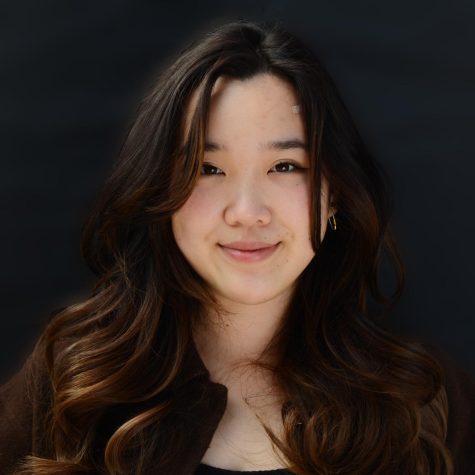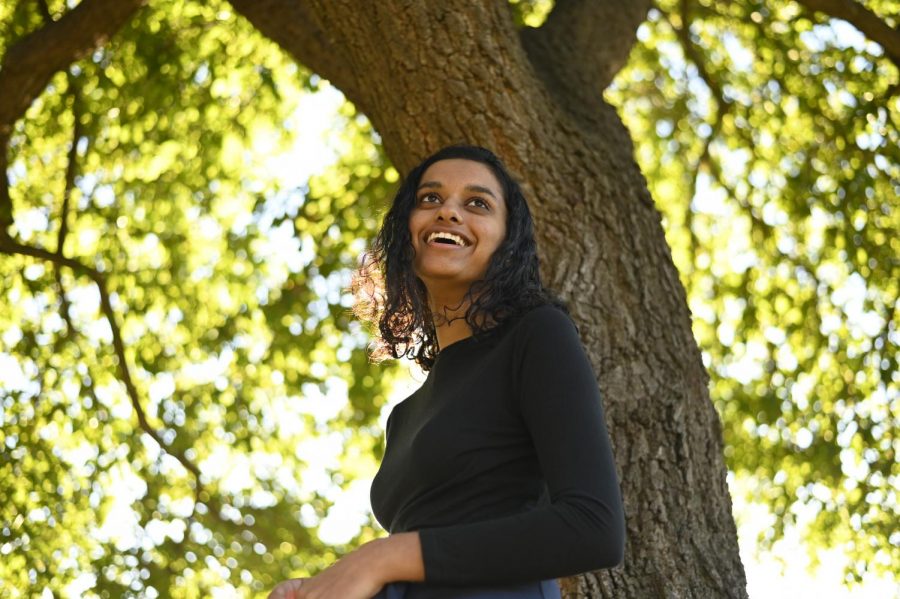Humans of Harker: Making her own way
Varsha Rammohan stays true to herself, finding self-confidence along her journey
“I’m a person who’s comfortable being by myself. But when I think of Jo, she was this headstrong, brilliant, determined, opinionated woman, and when I was younger, Jo was who I wanted to be when I grew up,” Varsha Rammohan (12) said.
“I intend to make my own way in this world.”
The independent and unapologetically defiant words uttered by tomboy Josephine “Jo” March, protagonist of Louisa May Alcott’s heartfelt, coming-of-age novel “Little Women.”
From a first glance, the differences between Jo and her younger sister, quiet and shy Elizabeth “Beth” March, seems incredibly vast. But beneath the former’s frenzied antics and the latter’s patient smile, Jo and Beth’s differences bind them as the closest of the four Match girls throughout the entire novel, caring and loving each other with a fierceness only sisters could.
In this dichotomy between Alcott’s fictional characters, Varsha Rammohan (12) finds a juncture of relatability and comfort.
“My favorite book of all time is ‘Little Women,’” said Varsha, who first read the book in second grade and made it a point to read again every year afterwards. “That book truly changed my life forever.”
Like Beth, Varsha isn’t the loudest person in the room. Varsha found entering a new high school incredibly awkward, and, at first, the transition to this unfamiliar environment proved a noticeable challenge.
“I’m a person who’s comfortable being by myself,” Varsha said. “But when I think of Jo, she was this headstrong, brilliant, determined, opinionated woman, and when I was younger, Jo was who I wanted to be when I grew up. ”
By reading, Varsha found her “perfect form of escapism.” The pandemic provided her the long-forgotten opportunity to dive back into the literary world because without the extra free time at home, Varsha would never have thought of picking up a book again.
During the summer of 2020, she spent hours reading with close friend Arushee Bhoja (‘19), delighting in reaching reading goals and discussing intricate plots and character arcs afterwards. Arushee sees a likeness in Varsha and many of their favorite characters: empathetic, thoughtful, kind.
“When you bring those qualities together, we always have really meaningful conversations,” Arushee said. “I can always go in more depth [with Varsha] because she’s such a reflective individual.”
Alongside reading, Varsha has also carried a genuine and longtime love for writing, another similarity she shares with comfort character Jo. Jo’s ardor, Varsha said, inspired her to explore more. Signing up for journalism in her freshman year did just that. Through journalism, she began finding her “own way in this world,” just as Jo did.
Since second grade, Varsha’s morning routine consisted of running down the driveway to get the morning paper and bringing it back to the breakfast table to read with her dad. This slow accumulation of knowledge, chipping away at the mountain of local, national and international news, became the foundation of her reporting skills and eventual leadership in journalism. Just reading the news each day gave her the yearning to learn more about the world outside her community bubble.
“It’s a practice that’s stayed with me since because I think there’s so much conversation and so much discourse that you can be a part of by flipping through the paper,” Varsha said.
A decade later, as a senior in high school, Varsha found herself staring at a Zoom screen filled with the faces of aspiring young journalists, some only freshmen journalism “cubs” who eagerly awaited her directions. On Nov. 3, the night of the 2020 presidential election, Varsha, one of the editors-in-chief of Harker Aquila, faced a long night and the mighty task of updating Aquila’s website with live coverage of the election. As the state votes began flooding in, a close mix of red and blue, Aquila’s coverage followed suit.
“This presidential election, especially since a couple other people and I have been covering since the primaries [in] March 2020, was a really rewarding time since we could watch everything come together as a staff,” Varsha said. “We live in such a politically charged environment, so speaking from a student journalist’s perspective, there’s always something to cover.”
Though she carried herself as a confident leader, Varsha started out like any other freshman joining the journalism program: eager to write, but a little nervous and completely unaware of the hectic world within the newsroom.
Through working closely with older editors, she began to find her rhythm as a writer and a reporter, and eventually, became a role model the incoming classes could look up to. In reaching that echelon, she credits the undeniable guidance and mentorship of her journalism family.
“The beauty of the program is that I learned so much from working with older editors, and that started from my freshman year,” Varsha said. “Having that support system of older editors and people from all different grades who I would never have talked to, if not for journalism, is what made me realize that this is something I really wanted to continue doing.”
Now in her last year of high school, Varsha hopes that she can pass on everything she learned to continue the cycle of mentorship that she feels so grateful to have been a part of.
“Now that I’m a senior and upperclassman, it’s really special to watch younger reporters and writers blossom into really talented reporters and editors,” Varsha said. “Such a special part of journalism is that there’s always that mentoring and teaching and learning aspect.”
Varsha’s extensive knowledge and sensitivity on topics allows her to empathize strongly with others, not only in her newsroom but with the communities she volunteers with beyond.
When she wanted to find a way to use her privilege to give back, her mother became one of her “biggest role models” to become more appreciative and aware of her surroundings and her place in the community.
“My mom has had a tremendous impact on me in helping me realize the power of volunteering and the power of community service,” Varsha said.
In first grade, Varsha’s mother would bring her and her brother to various volunteering events. Varsha’s earliest memory of volunteering emerged from the organization “My New Red Shoes,” which hosted back-to-school drives that donated volunteer-made school kits to low income people.
Then, since she was 7 or 8, Varsha and her mother would wake up at 5:30 a.m. on Sunday mornings, drive to a family friend’s house to make sandwiches and then deliver them to unsheltered populations in San Francisco’s Mission District, rain or shine.
“She’s really genuine, a very loyal friend, and she’s so compassionate and understanding,” close friend of four years Advika Phadnis (12) said. “That really shows in how much she cares about volunteering and giving back [to] the community.”
Throughout high school, Varsha grew into a confidence she never knew she had. Varsha harnesses the best qualities of both Beth and Jo: the humble, giving nature of the younger sister, and the caring, passionate self-confidence of the older one.
“She’s really grown a lot,” upper school English teacher Charles Shuttleworth, who taught Varsha during her freshman year as well as her senior year, said. “As a ninth grader, I was really impressed with her intelligence, but now, she’s also gained a lot more confidence, she’s so much more perceptive and thoughtful and she’s really blossomed over time. It’s been a pleasure to be able to see a student grow like that.”

Alysa Suleiman (12) is the co-editor-in-chief of Harker Aquila. This is her fourth year on staff, and she previously served as Aquila's first A&E editor,...


















![“[Building nerf blasters] became this outlet of creativity for me that hasn't been matched by anything else. The process [of] making a build complete to your desire is such a painstakingly difficult process, but I've had to learn from [the skills needed from] soldering to proper painting. There's so many different options for everything, if you think about it, it exists. The best part is [that] if it doesn't exist, you can build it yourself," Ishaan Parate said.](https://harkeraquila.com/wp-content/uploads/2022/08/DSC_8149-900x604.jpg)




![“When I came into high school, I was ready to be a follower. But DECA was a game changer for me. It helped me overcome my fear of public speaking, and it's played such a major role in who I've become today. To be able to successfully lead a chapter of 150 students, an officer team and be one of the upperclassmen I once really admired is something I'm [really] proud of,” Anvitha Tummala ('21) said.](https://harkeraquila.com/wp-content/uploads/2021/07/Screen-Shot-2021-07-25-at-9.50.05-AM-900x594.png)







![“I think getting up in the morning and having a sense of purpose [is exciting]. I think without a certain amount of drive, life is kind of obsolete and mundane, and I think having that every single day is what makes each day unique and kind of makes life exciting,” Neymika Jain (12) said.](https://harkeraquila.com/wp-content/uploads/2017/06/Screen-Shot-2017-06-03-at-4.54.16-PM.png)








![“My slogan is ‘slow feet, don’t eat, and I’m hungry.’ You need to run fast to get where you are–you aren't going to get those championships if you aren't fast,” Angel Cervantes (12) said. “I want to do well in school on my tests and in track and win championships for my team. I live by that, [and] I can do that anywhere: in the classroom or on the field.”](https://harkeraquila.com/wp-content/uploads/2018/06/DSC5146-900x601.jpg)
![“[Volleyball has] taught me how to fall correctly, and another thing it taught is that you don’t have to be the best at something to be good at it. If you just hit the ball in a smart way, then it still scores points and you’re good at it. You could be a background player and still make a much bigger impact on the team than you would think,” Anya Gert (’20) said.](https://harkeraquila.com/wp-content/uploads/2020/06/AnnaGert_JinTuan_HoHPhotoEdited-600x900.jpeg)

![“I'm not nearly there yet, but [my confidence has] definitely been getting better since I was pretty shy and timid coming into Harker my freshman year. I know that there's a lot of people that are really confident in what they do, and I really admire them. Everyone's so driven and that has really pushed me to kind of try to find my own place in high school and be more confident,” Alyssa Huang (’20) said.](https://harkeraquila.com/wp-content/uploads/2020/06/AlyssaHuang_EmilyChen_HoHPhoto-900x749.jpeg)



